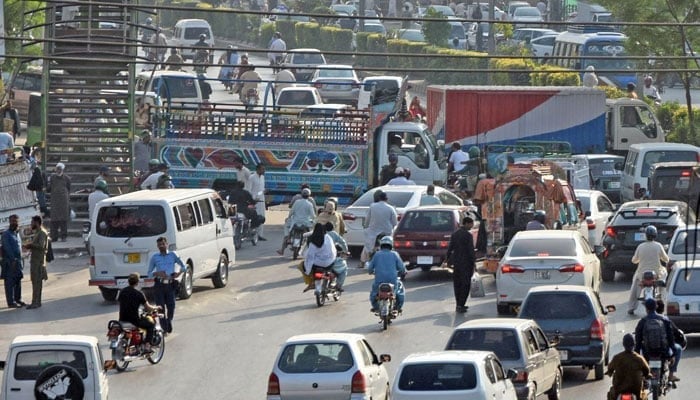Unchecked honking adds to noise pollution
Rawalpindi:Residents of Rawalpindi are increasingly voicing concerns over growing noise pollution in the city, particularly the incessant honking of vehicle horns on already congested roads.
“Once an occasional blare has now become a near-constant auditory assault, with drivers resorting to aggressive honking during traffic jams, intersections, and even in residential areas. The unchecked use of horns makes daily life unbearable,” citizens complain. “I live near Commercial Market and can’t even sit in my lounge without hearing a barrage of horns. It starts early in the morning and does not stop until late at night. There’s no regard for silence zones or schools,” says Wafa Abbas.
“Health experts warn that prolonged exposure to high decibel levels can lead to stress, sleep disturbances, and even hearing loss. According to the World Health Organization (WHO), noise levels exceeding 70 decibels can be harmful — a threshold often surpassed on Rawalpindi’s main arteries such as Murree Road, Committee Chowk, and Saddar,” says Arham Ali. “The city’s traffic police acknowledge the issue but cite limited resources and a lack of awareness as hurdles. We do conduct awareness campaigns and fine unnecessary honking under traffic regulations, but enforcement is difficult due to the volume of vehicles and lack of public cooperation,” says Alamdar Hussain.
“Noise pollution rules under the Pakistan Environmental Protection Act exist, but enforcement remains lax. Environmental activists say the problem requires a coordinated response. The city needs proper signage, awareness drives, and enforcement. Horns should be used sparingly, not as a way to vent frustration,” says Muhammad Adil. “With no immediate relief in sight, residents fear that the rising tide of noise pollution will continue to erode their quality of life, unless civic authorities take decisive steps to address what many are calling an acoustic crisis,” says Ali Akbar.
“Noise levels across several high-traffic zones frequently exceed the safe threshold of 85 decibels (dB) set by the National Environmental Quality Standards (NEQS), with readings near major hubs such as Pirwadhai Bus Terminal and Churr Chowk reaching up to 98 dB, according to data from the Pakistan Environmental Protection Agency,” says Ali Raza.
“Among the primary culprits are pressure horns — despite a ban on their use — and two-stroke rickshaws, which generate noise well above 120 dB. Commercial areas such as Raja Bazaar, Murree Road, and Tench Bhatta remain hotspots for this unchecked auditory nuisance,” says Hasan Askari.
“I can’t sleep properly anymore. There is constant honking, even at night. My children complain of headaches and stress. Noise pollution is degrading the overall quality of life,” says Kaneez Fatima, a resident of Committee Chowk.
Qamar Abbas says, “A study found that nearly 87% of respondents in densely trafficked areas reported sleep disturbances, while more than 60% cited stress, fatigue, and irritability caused by noise exposure.”
-
 Andrew Mountbatten-Windsor Throws King Charles A Diplomatic Crisis
Andrew Mountbatten-Windsor Throws King Charles A Diplomatic Crisis -
 Barack Obama Hails Seahawks Super Bowl Win, Calls Defense ‘special’
Barack Obama Hails Seahawks Super Bowl Win, Calls Defense ‘special’ -
 Pregnant Women With Depression Likely To Have Kids With Autism
Pregnant Women With Depression Likely To Have Kids With Autism -
 $44B Sent By Mistake: South Korea Demands Tougher Crypto Regulations
$44B Sent By Mistake: South Korea Demands Tougher Crypto Regulations -
 Lady Gaga Makes Surprising Cameo During Bad Bunny's Super Bowl Performance
Lady Gaga Makes Surprising Cameo During Bad Bunny's Super Bowl Performance -
 Paul Brothers Clash Over Bad Bunny's Super Bowl Performance
Paul Brothers Clash Over Bad Bunny's Super Bowl Performance -
 South Korea: Two Killed As Military Helicopter Crashes During Training
South Korea: Two Killed As Military Helicopter Crashes During Training -
 Elon Musk Unveils SpaceX’s Moon-first Strategy With ‘self Growing Lunar City’
Elon Musk Unveils SpaceX’s Moon-first Strategy With ‘self Growing Lunar City’ -
 Donald Trump Slams Bad Bunny's Super Bowl Performance: 'Absolutely Terrible'
Donald Trump Slams Bad Bunny's Super Bowl Performance: 'Absolutely Terrible' -
 Jake Paul Criticizes Bad Bunny's Super Bowl LX Halftime Show: 'Fake American'
Jake Paul Criticizes Bad Bunny's Super Bowl LX Halftime Show: 'Fake American' -
 Prince William Wants Uncle Andrew In Front Of Police: What To Expect Of Future King
Prince William Wants Uncle Andrew In Front Of Police: What To Expect Of Future King -
 Antioxidants Found To Be Protective Agents Against Cognitive Decline
Antioxidants Found To Be Protective Agents Against Cognitive Decline -
 Hong Kong Court Sentences Media Tycoon Jimmy Lai To 20-years: Full List Of Charges Explained
Hong Kong Court Sentences Media Tycoon Jimmy Lai To 20-years: Full List Of Charges Explained -
 Coffee Reduces Cancer Risk, Research Suggests
Coffee Reduces Cancer Risk, Research Suggests -
 Katie Price Defends Marriage To Lee Andrews After Receiving Multiple Warnings
Katie Price Defends Marriage To Lee Andrews After Receiving Multiple Warnings -
 Seahawks Super Bowl Victory Parade 2026: Schedule, Route & Seattle Celebration Plans
Seahawks Super Bowl Victory Parade 2026: Schedule, Route & Seattle Celebration Plans




